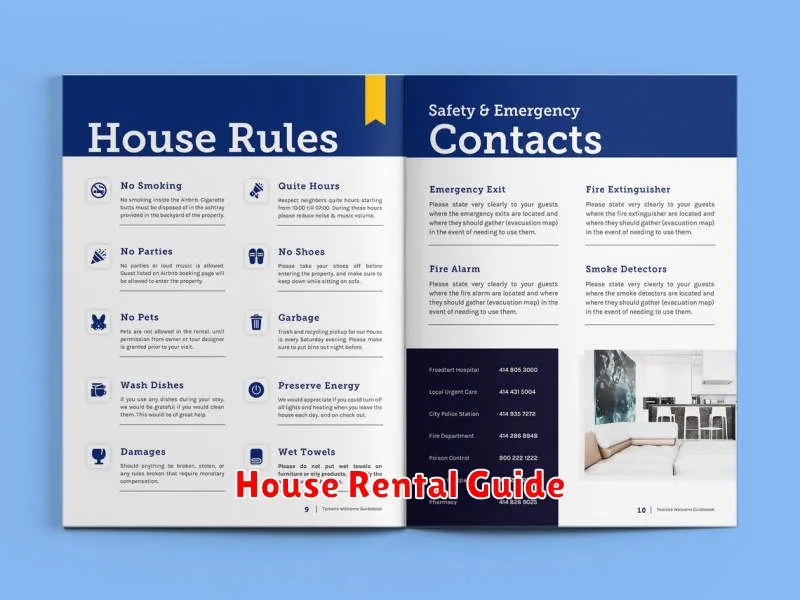Finding the perfect house rental can feel like searching for a needle in a haystack, but it doesn’t have to be! This article provides 10 essential tips to streamline your search, helping you navigate the rental market and find the ideal apartment or house for rent that perfectly fits your needs and budget. Whether you’re a first-time renter or a seasoned pro, these tips and tricks will make your house hunting experience significantly easier and more successful. Get ready to find your dream rental property!
How to Define Your Rental Budget
Defining your rental budget is the first and most crucial step in your house hunt. It dictates everything from the type of property you can consider to the neighborhoods you can explore. Before you start browsing listings, you need to establish a clear number.
Begin by assessing your monthly income. A general rule of thumb is to spend no more than 30% of your gross monthly income on rent. However, this can be adjusted based on your personal financial situation and other expenses.
Next, carefully list all your monthly expenses including utilities, transportation, food, debt payments, and entertainment. Subtract these from your monthly income to determine how much you have left for rent. Be realistic and include a buffer for unexpected costs.
Consider additional rental costs beyond the monthly rent. These often include security deposits (usually one to two months’ rent), pet fees (if applicable), and renter’s insurance, which is highly recommended.
Finally, stick to your budget. While it’s tempting to stretch your limits for a dream house, overspending on rent can lead to financial strain. Prioritize your financial health and choose a rental within your comfortable budget.
The Importance of Location in Choosing a Rental House

Choosing the right location is arguably the most crucial factor when searching for a rental house. Location significantly impacts your daily life and overall quality of living. It’s not just about proximity to work; it encompasses several key aspects.
Commute time: A shorter commute translates to less stress, more free time, and potentially lower transportation costs. Consider not only the distance but also traffic patterns and public transport availability.
Neighborhood safety: Research the crime rates and overall safety of the neighborhood. Look for areas with well-maintained streets, active community involvement, and a sense of security. Your safety and peace of mind are paramount.
Amenities and conveniences: Proximity to essential amenities like grocery stores, pharmacies, hospitals, schools, and parks dramatically increases your convenience and reduces daily hassles. Think about your lifestyle and what’s important to you within easy reach.
School districts: If you have children or plan to, the quality of nearby schools is a critical factor. Research school rankings and reviews to ensure a suitable learning environment.
Property values: While not directly related to renting, understanding the long-term appreciation of properties in the area can provide peace of mind, knowing you’re in a stable and potentially appreciating neighborhood.
In essence, location is an investment in your overall well-being and convenience. Thoroughly researching potential locations is an essential step in securing a perfect rental home.
Top Questions to Ask Before Renting a House
Before signing that lease, arm yourself with the right questions. Asking the right questions can save you from headaches down the road. Here are some crucial ones:
What is included in the rent? This seems obvious, but clarify whether utilities (water, electricity, gas, trash), landscaping, or internet are included, or if you’ll be responsible for paying them separately.
What is the pet policy? If you have pets, inquire about pet rent, any breed restrictions, or weight limits. Get this in writing.
What are the terms of the lease? Understand the lease duration (e.g., month-to-month, year-long), renewal process, and any penalties for breaking the lease early.
What is the process for repairs and maintenance? Find out who is responsible for repairs (landlord or tenant) and how to report issues. Ask about the typical response time for maintenance requests.
Are there any restrictions? Inquire about parking, noise levels, guest limitations, or other rules enforced by the landlord or the building.
Can I see a copy of the lease before signing? Don’t hesitate to thoroughly review the lease agreement before committing. Don’t be afraid to ask for clarification on anything you don’t understand.
What is the security deposit policy? Understand the amount, when it will be returned, and under what conditions. Get everything in writing.
What is the landlord’s contact information? Note down how best to reach the landlord or property manager in case of emergencies or other issues.
Asking these key questions will ensure you understand your rights and responsibilities, ultimately leading to a smoother and more satisfying rental experience.
Understanding Lease Agreements for House Rentals
Before signing any lease, carefully review the entire document. Don’t hesitate to ask questions if anything is unclear. Understanding the terms is crucial to avoid future disputes.
Pay close attention to the lease duration. This specifies the length of your rental agreement. Also, note any clauses regarding early termination and associated penalties.
The lease should clearly state the monthly rent and the due date. It should also specify the method of payment, whether it’s via check, online transfer, or other means.
Utilities are a key consideration. Determine which utilities are included in the rent (e.g., water, electricity, gas) and which ones you’re responsible for.
The lease should define the responsibilities of both the landlord and the tenant, including maintenance and repairs. Understand who is responsible for what.
Check for clauses regarding pet policies, if applicable. Some landlords may charge pet rent or have breed restrictions.
Review the section on late payment fees and other potential charges. Be aware of the consequences of late rent payments.
Understand the renewal process outlined in the lease. Knowing how the lease is renewed and under what terms is crucial for long-term planning.
Security deposit details should be clearly stated. This includes the amount, how it will be held, and under what conditions it will be returned.
Finally, before signing, read the entire lease thoroughly. If you’re unsure about anything, seek legal advice. A well-understood lease agreement protects both the landlord and the tenant.
How to Inspect a Rental Property Before Moving In
Before signing a lease, a thorough inspection of the rental property is crucial. This protects you from unexpected repairs and disputes with the landlord later. Here’s how to do it effectively:
1. Walkthrough with the Landlord: Schedule a walkthrough with the landlord or their representative. This allows you to point out any existing issues before you move in.
2. Check Everything: Systematically inspect every room. Look for damage to walls, floors, ceilings, windows, and doors. Test all appliances (oven, refrigerator, dishwasher, etc.), plumbing fixtures (toilets, sinks, showers), and electrical outlets.
3. Document Everything: Take photos and videos of any existing damage, no matter how minor. This photographic record will serve as important evidence if disagreements arise later.
4. Test the HVAC System: Turn on the heating and air conditioning to ensure they are functioning properly. Note the temperature and air flow.
5. Check Smoke and Carbon Monoxide Detectors: Make sure these vital safety devices are installed and working correctly.
6. Inspect for Pests: Look for any signs of pest infestation, such as droppings, holes, or insects.
7. Exterior Inspection: Don’t forget the outside! Check the condition of the roof, gutters, landscaping, and any exterior structures.
8. Review the Lease: Carefully read the lease agreement before signing. Ensure it accurately reflects the condition of the property and outlines responsibilities for repairs.
9. Create a Detailed Report: Create a written report documenting all observations, including photos. Have the landlord sign and date the report, acknowledging the existing conditions.
10. Don’t Hesitate to Ask Questions: If you have any questions or concerns, don’t hesitate to ask the landlord or property manager before signing the lease. A thorough inspection can prevent many future headaches.
Tips for Negotiating Rent with Landlords
Negotiating rent can feel daunting, but a little preparation can go a long way. Research comparable rentals in the area to understand the market value. This gives you a strong foundation for your negotiation.
Be polite and professional throughout the process. A respectful approach fosters a more collaborative environment, making landlords more receptive to your requests.
Highlight your strengths as a tenant. Emphasize your stable income, positive rental history, and commitment to property maintenance. Landlords value reliable tenants.
Offer a longer lease term. A longer commitment can incentivize landlords to offer a lower monthly rate or other concessions. This demonstrates your stability and reduces their vacancy risk.
Consider offering a larger security deposit. While not ideal, offering a higher security deposit might sway a landlord to lower the monthly rent, especially in a competitive market.
Be prepared to walk away. Knowing your limits and being willing to walk away from a deal strengthens your negotiating position. Don’t settle for a rent you’re uncomfortable with.
Negotiate other terms besides rent. Explore possibilities such as flexible lease terms, pet fees (if applicable), or included utilities. These smaller negotiations can add up to significant savings.
Time your negotiation strategically. Negotiating during periods of lower demand, such as the off-season, can increase your chances of success. Landlords may be more willing to compromise when vacancies are higher.
Document everything. Keep copies of all communications, agreements, and signed documents. This protects you in case of any future disputes.
Don’t be afraid to counter-offer. Landlords expect some negotiation. Present your counter-offer confidently and rationally, based on your research and the points discussed above. A well-reasoned counter-offer shows that you’re serious and prepared.
Common Mistakes to Avoid When Renting a House

Finding the perfect rental can be exciting, but rushing the process often leads to regret. One common mistake is skipping thorough inspections. Before signing a lease, meticulously check the property’s condition, noting any existing damages. Take photos as proof and report them to the landlord immediately. Ignoring this step can leave you responsible for pre-existing issues.
Another frequent oversight is neglecting to read the lease carefully. Understand every clause, including terms about rent payments, lease duration, pet policies, and responsibilities for repairs. Don’t hesitate to ask questions if anything is unclear; a good landlord will be happy to explain. Failing to fully comprehend the lease can result in unexpected costs or disagreements later on.
Failing to verify the landlord’s legitimacy is a serious error. Check online reviews and verify their licensing and registration if required in your area. Scammers frequently use deceptive tactics; protect yourself by conducting thorough background checks. This precaution can save you from potential fraud and legal battles.
Finally, overlooking the neighborhood is a crucial mistake. While focusing on the house itself, consider the surrounding area. Is it safe? Is it convenient to your work and other necessities? Investigating the neighborhood ensures a comfortable and suitable living environment. A seemingly perfect house can become undesirable if the location isn’t right for you.
Benefits of Long-Term House Rentals
Long-term house rentals, typically lasting a year or more, offer several significant advantages over shorter-term leases. These benefits extend beyond simply having a stable place to live.
Firstly, cost savings are often a major draw. Landlords frequently offer discounted monthly rates for longer lease agreements. This predictability in housing costs makes budgeting easier and more manageable.
Secondly, stability and security are paramount. Knowing you have a secure place to live for an extended period reduces stress and allows for better planning. This is especially beneficial for those establishing themselves in a new community or focusing on career goals.
Thirdly, building a relationship with your landlord is easier. A longer-term agreement fosters trust and open communication, making it simpler to address any maintenance issues or concerns that may arise during your tenancy.
Finally, amenities and flexibility can be negotiated. Long-term tenants often have more leverage to discuss desired upgrades, pet policies, or other lease terms with the landlord. This can lead to a more personalized and comfortable living experience.
Conclusion: Ensuring a Smooth Rental Process
Finding the perfect rental home is a significant undertaking, but with careful planning and the right approach, the process can be surprisingly smooth. Remember to thoroughly research potential properties, communicate clearly with landlords or property managers, and carefully review all lease agreements before signing.
By following the tips outlined in this article, you can significantly increase your chances of finding a rental property that meets your needs and fits your budget. Proactive communication and meticulous attention to detail are key to a successful rental experience. Don’t hesitate to ask questions—clarity is paramount. Good luck with your house hunt!

